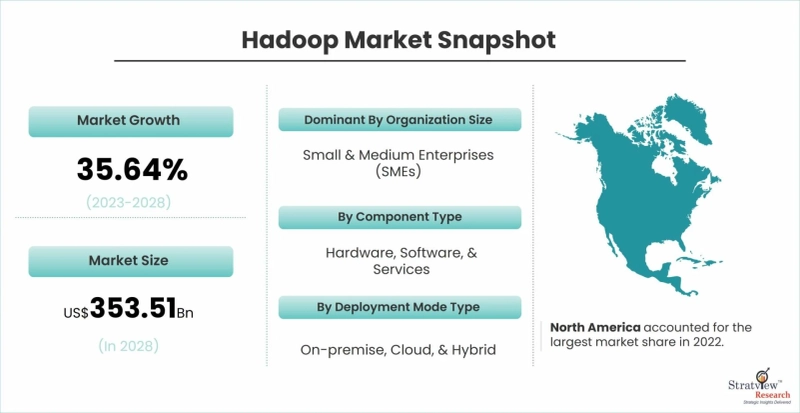The Hadoop market has undergone significant expansion since its introduction, evolving into a key player in the realm of big data analytics and data management. As enterprises across various industries increasingly rely on data to drive their strategic decisions, Hadoop's robust framework continues to garner widespread adoption. This article delves into the trends fueling the Hadoop market's growth and offers predictions for its future trajectory.
According to Stratview Research, the Hadoop Market was estimated at USD 56.61 billion in 2022 and is likely to grow at a CAGR of 35.64% during 2023-2028 to reach USD 353.51 billion in 2028.
Increasing Data VolumesOne of the primary drivers of Hadoop's growth is the exponential increase in data volumes. With the proliferation of digital technologies, the Internet of Things (IoT), social media, and e-commerce, organizations are generating more data than ever before. Traditional data management systems are often ill-equipped to handle such vast amounts of information, prompting a shift towards Hadoop's scalable and distributed framework. This trend is expected to continue as data generation accelerates, solidifying Hadoop's position as an essential tool for big data analytics.
Adoption Across IndustriesHadoop's versatility has led to its adoption across a diverse range of industries. Sectors such as finance, healthcare, retail, and telecommunications are leveraging Hadoop to gain insights from their data, optimize operations, and enhance customer experiences. For instance, financial institutions use Hadoop for fraud detection and risk management, while healthcare providers employ it for patient data analysis and personalized treatment plans. As more industries recognize the value of data-driven decision-making, Hadoop's market presence is set to expand further.
Advancements in Hadoop EcosystemThe Hadoop ecosystem has witnessed continuous innovation, with new tools and frameworks being developed to enhance its capabilities. Projects like Apache Spark, Hive, Pig, and HBase have become integral components of the Hadoop ecosystem, providing advanced analytics, real-time processing, and efficient data querying. These advancements make Hadoop more powerful and user-friendly, driving its adoption among organizations seeking comprehensive data solutions.
Cloud IntegrationThe integration of Hadoop with cloud platforms has been a game-changer for the market. Cloud-based Hadoop services offered by providers like Amazon Web Services (AWS), Microsoft Azure, and Google Cloud Platform (GCP) provide scalable, on-demand infrastructure. This eliminates the need for significant upfront investment in hardware and reduces the complexity of managing on-premises Hadoop clusters. The flexibility and scalability of cloud-based Hadoop solutions are attracting more businesses, contributing to market growth.
Emphasis on Data Security and ComplianceWith the increasing focus on data privacy and regulatory compliance, organizations are prioritizing robust data management practices. Hadoop's security features, including data encryption, access controls, and comprehensive auditing, make it a valuable tool for maintaining compliance with regulations like GDPR and CCPA. As regulatory landscapes become more stringent, the demand for secure data management solutions like Hadoop is expected to rise.
Growing Investment in Big Data AnalyticsOrganizations are investing heavily in big data analytics to gain a competitive edge. According to industry reports, global spending on big data analytics is projected to continue growing at a rapid pace. Hadoop's cost-effectiveness, scalability, and ability to handle diverse data types make it a preferred choice for enterprises looking to harness the power of big data. This investment trend is likely to drive further adoption and innovation in the Hadoop market.
Predictions for the Future
Looking ahead, the Hadoop market is poised for sustained growth and evolution. Here are some key predictions:
Increased Integration with AI and Machine Learning: As artificial intelligence (AI) and machine learning (ML) become more prevalent, Hadoop will play a critical role in managing and processing the vast datasets required for these technologies. Enhanced integration with AI and ML frameworks will drive new use cases and applications.
Expansion into Emerging Markets: The adoption of Hadoop is expected to grow in emerging markets, driven by the digital transformation initiatives of businesses and governments. Regions like Asia-Pacific and Latin America will witness increased Hadoop deployments as they strive to become data-driven economies.
Focus on Real-Time Analytics: The demand for real-time data processing and analytics will continue to rise, leading to further advancements in Hadoop's real-time capabilities. Technologies like Apache Flink and Kafka will be integrated more closely with Hadoop to meet this demand.
Enhanced User Experience: The Hadoop ecosystem will see improvements in user experience, with more intuitive interfaces and simplified workflows. This will make Hadoop accessible to a broader audience, including non-technical users.
Conclusion
The Hadoop market is experiencing robust growth, driven by increasing data volumes, cross-industry adoption, technological advancements, cloud integration, data security needs, and significant investment in big data analytics. As organizations continue to recognize the value of data-driven decision-making, Hadoop's role as a cornerstone of big data infrastructure will only strengthen. By staying ahead of trends and embracing innovations, the Hadoop market is set to thrive in the dynamic landscape of the digital age.


